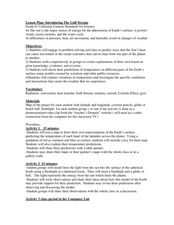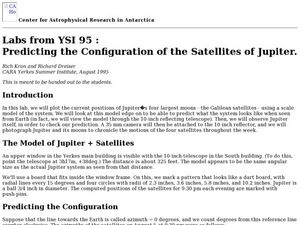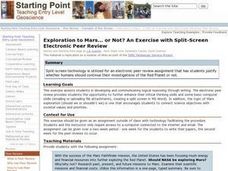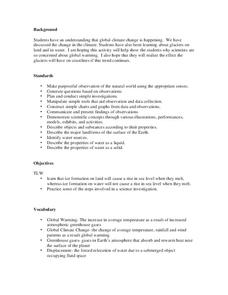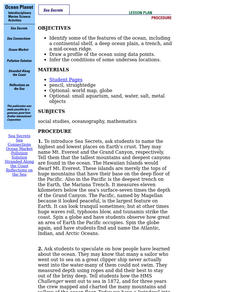Curated OER
Concept Application: One to One Correspondence of Objects
Learners consider the comparative sizes of the planets in the solar system. In this scale instructional activity, students select balls of different sizes to represent the planets in the solar system.
Curated OER
How Many Days Are in a Year?
Students create a calendar for an imaginary planet. In this earth science lesson plan, students analyze the errors on the different calendars used on Earth. They present their work in class.
Curated OER
Meteors
Learners identify the different types of meteorite using an interactive website. In this earth science lesson, students simulate how meteors crash on a surface. They relate meteor size to crater size.
Curated OER
Season's Greetings
Students explore Earth's seasons using an interactive website. In this earth science lesson, students watch video segments and explain Earth's seasonal milestones. They discuss the factors that causes seasonal changes.
Curated OER
Introducing The Gulf Stream
Sixth graders research the average temperatures of different places on Earth. In this earth science lesson, 6th graders explain how the sun's heat cause ocean movement. They discuss how temperature change affects the weather we experience.
Curated OER
Solar System Bead Distance Activity
Middle schoolers create a scaled solar system model using colorful beads. In this space science instructional activity, students convert AU units into metric measurements. They arrange the planets according to their distances from the sun.
Curated OER
Predicting the Configuration of the Satellites of Jupiter
Students plot the positions of the planet Jupiter while predicting what the configuration system looks like from Earth. For this configuration of satellites lesson, students photograph Jupiter and its moons to record the motions of the...
Curated OER
Volcanoes
Students explore the formation of volcanoes. In this earth science lesson, students build their own volcanoes in the lab using different materials. They identify the different types of volcanoes.
Curated OER
Ice is N"ICE"!!
Students observe and describe, both orally and in writing. the different forms of water on the surface of the Earth and measure the approximate size of an iceberg. They also estimate and measure the amount of ice that floats above the...
Curated OER
Exploration to Mars... or Not? An Exercise with Split-Screen Electronic Peer Review
Students use split-screen technology which is utilized for an electronic peer review assignment that has students justify whether humans should continue their investigations of the Red Planet or not.
Curated OER
An Invisible Pull
Fifth graders explain why objects thrown upward falls back to Earth. In this earth science lesson plan, 5th graders identify the forces acting on objects. They discuss why planets do not float in space.
Curated OER
Mud Splat Craters
Students simulate crater formation using mud. In this earth science lesson, students identify the features of a crater. They explain how the force of impact affect the crater's appearance.
Curated OER
Global Climate Change
Second graders investigate the effect of melting glaciers to sea level. In this earth science lesson, 2nd graders simulate the process in the lab by conducting an experiment using ice cubes and clay. They explain the consequences of...
Curated OER
Environmental Issues
Students investigate the natural resources on earth by reading a book in class. In this environmental lesson, students read select pages from the book Alaska by Rebecca Stefoff and discuss their feelings on the material. Students write...
Curated OER
Energy Inspiration Document and Website Production
Seventh graders conduct a web quest to find information on types of energy found in US. In this earth science lesson, 7th graders investigate the environmental consequences of using these resources. They develop a creative presentation...
Curated OER
Extreme Elevations
In this geography worksheet, 5th graders work in groups in order to locate and graph mountains found on all the continents of planet earth.
Curated OER
Living With the Heat: The Ring of Fire
Students investigate the planet Earth's infamous ring of fire and the life that thrives from it. In this ocean environment lesson plan, students investigate hydrothermal vents and how organisms thrive off their heat. Students complete...
Curated OER
Ocean Planet: Sea Secrets
Students identify ocean features and draw a profile using data points on a map. Through discussion and research, they discover the importance of oceanography and plot a profile of the ocean floor in search for a vessel full of precious...
Curated OER
What Orbital Dynamic Variables are Responsible for Earth's Weather?
Students explore the changing of the seasons. In this astronomy and seasons instructional activity, students construct a model of the revolution of the sun and the moon. Students compare the recorded solstice/equinox orbital positions...
Curated OER
Winter Season
Students recognize the relationship between Earth's tilt and the Winter season. In this Winter lesson, students work in pairs to complete make frost and design snow goggles. Students experiment a hand lens to study the frost created....
Curated OER
Planets in a Bottle
Learners experiment with yeast. In this environmental conditions lesson students test the viability of samples of yeast. Learners investigate the effects of environmental conditions on the yeast.
Curated OER
Fostering Geospatial Thinking: Space to Earth: Earth to Space (SEES)
High schoolers locate and access data to help them with their science inquiry. In this geographical positioning lesson students evaluate and compare data sets.
Curated OER
Our Changing View of the Earth
Students explore the theory of Plate Tectonics. They participate in a simulation in which they re-enact the debate over Plate Tectonics vs. traditional beliefs of stationary continents that were widely accepted during the 1800's and...
Curated OER
Earth's Age: The Dating Game
Young scholars conduct a simulation to determine radioactive decay and half-life. Using pennies, dice or sugar cubes as isotopes placed in shoe boxes simulating rocks, they hold five trials representing 1000 years each to find the...






